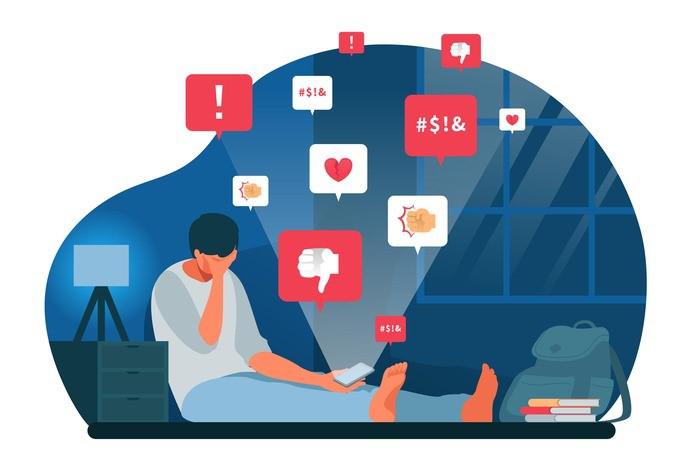
The cons of social media
Since it’s a relatively new technology, there’s little research to establish the long-term consequences, good or bad, of social media use. However, multiple studies have found a strong link between heavy social media and an increased risk for depression, anxiety, loneliness, self-harm, and even suicidal thoughts.
Social media may promote negative experiences such as:
Inadequacy about your life or appearance. Even if you know that images you’re viewing on social media are manipulated, they can still make you feel insecure about how you look or what’s going on in your own life. Similarly, we’re all aware that other people tend to share just the highlights of their lives, rarely the low points that everyone experiences. But that doesn’t lessen those feelings of envy and dissatisfaction when you’re scrolling through a friend’s airbrushed photos of their tropical beach holiday or reading about their exciting new promotion at work.
How is social media affecting my time?
Did you know? Social media is addictive because it is made to be that way. The designers know that the more popular a site is and the more time people spend on it, the more money advertisers will pay.
Being on social media is like riding a spirited horse—control it, or it will control you.
The allure of endless scrolling and the constant stream of notifications can easily consume our valuable time and divert our attention from more important tasks. It’s not uncommon to find ourselves unintentionally spending hours on social media, resulting in reduced productivity and a sense of time slipping away.
Finding the right balance between social media usage and time management is crucial for maintaining a healthy and productive lifestyle. It requires us to be mindful of how we engage with social media and proactively manage our time to ensure we can fully reap the benefits of these platforms without compromising other aspects of our lives.
What you can do. Set a limit for how much time you will spend on social media, and stay within that limit.
How is social media affecting my sleep?
Did you know? Insufficient rest can contribute to anxiety and depression. According to psychology professor Jean Twenge, a lack of sleep is the ultimate dampener to mood. She adds that “over time,” sleep deprivation can lead to “serious mental health issues.”
Most experts say that teenagers need at least eight hours of sleep each night, but many are getting less. Use of social media may contribute to that problem.
Data shows that the use of technology, especially social media, within one hour of bedtime is associated with sleep disruptions. There are associations between digital media use and delayed sleep, daytime sleepiness, sleep duration and quality, and sleep deficiency for 16- to 25-year-olds. Sleep loss and insufficient sleep can influence neurological development and are risk factors for depression, suicidal thoughts, mood disturbances, injuries, attention problems, and excessive weight gain.
What you can do. Keep electronic devices out of your bedroom at night. Whenever possible, stop using screens two hours before bedtime. If you need an alarm to wake you up in the morning, consider using one that isn’t on a phone or tablet.
How is social media affecting my emotions?
Did you know? While social media can help you keep in touch with friends, it is no replacement for in-person conversations. “Electronic connection does not seem to satisfy our deep-seated need for true human contact,” writes Dr. Nicholas Kardaras. “It does not address the underlying need for real in-depth connection.”
The use of social media significantly impacts mental health. It can enhance connection, increase self-esteem, and improve a sense of belonging. But it can also lead to tremendous stress, pressure to compare oneself to others, and increased sadness and isolation. Mindful use is essential to social media consumption.
What you can do. Try a “social media detox”—a break from social media that lasts a few days, a week, or even a month. Increase the amount of time you spend with friends face-to-face or on the phone. See if you begin to feel less stressed and happier during your break from social media.
References:
https://www.jw.org/en/bible-teachings/teenagers/ask/how-social-media-affects-me
https://timeanalyticssoftware.com/how-to-harness-the-power-of-social-media-without-sacrificing
https://socialharms.utah.gov/english/how-does-social-media-affect-sleep